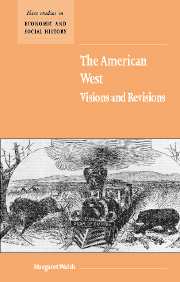Book contents
- Frontmatter
- Contents
- List of maps
- List of tables
- Acknowledgements
- 1 The frontier and the west: realities, myths and the historians
- 2 Land and landscapes: occupation and ownership
- 3 Peoples and migrations
- 4 Making a living: early settlements and farming
- 5 Making a living: non-farming occupations
- 6 Western communities
- Epilogue
- References
- Index
- More Titles in the New Studies in Economic and Social History Series
5 - Making a living: non-farming occupations
Published online by Cambridge University Press: 05 June 2012
- Frontmatter
- Contents
- List of maps
- List of tables
- Acknowledgements
- 1 The frontier and the west: realities, myths and the historians
- 2 Land and landscapes: occupation and ownership
- 3 Peoples and migrations
- 4 Making a living: early settlements and farming
- 5 Making a living: non-farming occupations
- 6 Western communities
- Epilogue
- References
- Index
- More Titles in the New Studies in Economic and Social History Series
Summary
The economy of the American west was not based solely on agriculture. Abundant natural resources provided hunters, trappers, miners and loggers with employment while towns and cities emerged or boomed to support both these businesses and farmers and to offer a range of manufacturing and tertiary occupations. The west was a land of many contrasts among the labour force. There were heroic individualists and anonymous workers. It may be romantic to remember that Buffalo Bill Cody killed many buffaloes when he contracted to supply meat for railroad construction workers in 1867–8; but it may be more realistic to remember that at a similar time Chicago was a major manufacturing and transport centre or that the silver mines of the Comstock Lode were employing hundreds of day labourers in poor conditions. Too much of the workers' history of the west has been written as either adventure stories of the fur traders of the Rocky Mountains, the forty-niners, the cowboys, or the prostitutes with hearts of gold. There were many others in the west who struggled to earn a living through exploiting natural resources or in urban employment. Most were classified as gainfully employed in the census, but there were major differences between the businessmen who did the employing, the workers who were poorly paid and the individuals seeking wealth. All deserve consideration in broadening the assessment of the economic development of the west.
- Type
- Chapter
- Information
- The American West. Visions and Revisions , pp. 93 - 113Publisher: Cambridge University PressPrint publication year: 2004



